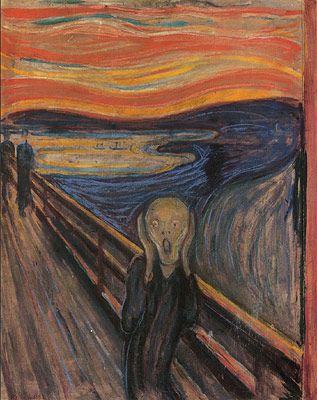
Screw modern art.
Did I do that right? That eye-catching intro?
Ahem.
Over the time humans have been creating art, we've also been innovating it, even if those innovations resisted against aesthetic conventions.
Paintings used to serve as tributes, and they eventually developed into status indicators for the wealthy. Then, skipping a few centuries, we arrived at the murky modern-art era and a transition to emotion where we're required to interpret people's creations.
Art is still in this phase of purpose, but with the invention of time-based media, we're able to influence a consumer's emotions. This means that a video game's success is based on an analog response, an up-and-down spectrum of emotion whereas earlier art usually evoked one response.
 You don't look at Edvard Munch's The Scream and experience a beautiful horizon and then a horrible scream. You simply look at the painting and feel an emotion.
You don't look at Edvard Munch's The Scream and experience a beautiful horizon and then a horrible scream. You simply look at the painting and feel an emotion.
Games have a huge advantage here. They can summon an emotion just as well if not better than any painting, ultimately controlling the consumer.
For example, do you remember that moment of fear after stumbling into a corprus-stalker den in the Elder Scrolls III: Morrowind and then the feeling of salvation you felt after clearing it?
Or what about that holy-crap sequence in Halo: Combat Evolved after encountering 343 Guilty Spark?
These were real emotional reactions. You were legitimately scared and then legitimately relieved. Art from 200 years ago had nothing on that.
Video games cater to each individual consumer. They have the ability to give you choice in how a story will unfold. Players can satisfy their desires to be evil or good, strong or stealthy, big or small.
As long as art is about evoking emotion, games will have more control and versatility than any other medium. But impressive interactive narratives aren't widely appreciated because our society stigmatizes them.
The idea of games as an art form finds the same resistance as modern art. But for now, when someone insults World of Warcraft, players will have to bite their lip and quietly appreciate the truest form of creative expression.
VentureBeat's mission is to be a digital town square for technical decision-makers to gain knowledge about transformative enterprise technology and transact. Learn More
